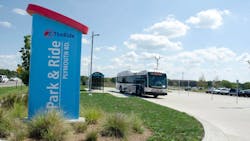Ann Arbor's TheRide cuts executive pay, 15 percent of workforce to maintain service during pandemic
The Ann Arbor Area Transportation Authority (TheRide), like several other transit providers, is instituting a series of cost cutting measures that include staff layoffs as it navigates financially rough waters while maintaining essential services.
Losses of $600,000 per month or about 15 percent of TheRide’s budget have resulted from the suspension of fares to aid social distancing on its fixed-route services, which have been reduced by 70 percent from regular levels.
To strengthen its financial position, TheRide’s executive staff, including CEO Matthew Carpenter and two deputy CEOs have voluntarily reduced their pay by 10 percent for the next six months. Additionally, 15 percent of the workforce will be permanently reduced. The 44 positions affected include union and non-union employees.
“This is a tremendously difficult decision, but the impacts of COVID-19 have forced us to quickly update our priorities in order to ensure we can continue to provide services in the future. There are no easy solutions – TheRide faces great uncertainty in its finances, and the economic impacts of the pandemic pose a threat to the agency’s mission in the community,” Carpenter said.
TheRide explains its largest expense is staffing costs. Since Gov. Gretchen Whitmer declared Michigan to be in a state of emergency on March 11, TheRide has kept all staff employed; office staff worked from home, front-line staff who were on the job were paid time and a half, and many staff received full pay even as they stayed at home simply because there was no work that could be done. TheRide explains these layoffs are designed to avoid further service reductions and will enhance the ability to restore service once businesses and schools begin to reopen.
“TheRide was fortunate to be able to afford this temporary stopgap to help maintain peace of mind while we flattened the curve, but we cannot continue this spending indefinitely,” said Carpenter. “Without changes, our projections suggest insolvency could happen before summer 2021, and we are still expecting unforeseen costs and additional loss of revenue. Changes to our staffing costs are an unavoidable and unfortunate necessity.”
The reduction in staff and pay cuts, along with the cancellation of all travel and offsite training and restrictions on future hiring, will result in about $4.9 million in annualized savings. The transportation authority will tap into reserve funds and utilize the federal funding provided through the Coronavirus Aid, Relief and Economic Security (CARES) Act to further solidify its financial position, but Carpenter cautions about the situations many unknowns.
“The future remains very uncertain as we simply do not know how long these funds will need to last, whether the state government will cut its funding, what unforeseeable expenses will occur and how much it will cost to restore services,” he said. “For all those reasons, we believe that preserving our resources now is the best strategy to ensure we can continue to meet the community’s needs in the future.”
Carpenter continued, “Going forward, we will rebuild our team along new lines and chart a sustainable course in our new circumstances. The organization that emerges will look different from how it was before, but we will still be here to support our communities, residents and passengers.”
About the Author

Mischa Wanek-Libman
Group Editorial Director
Mischa Wanek-Libman is director of communications with Transdev North America. She has more than 20 years of experience working in the transportation industry covering construction projects, engineering challenges, transit and rail operations and best practices.
Wanek-Libman has held top editorial positions at freight rail and public transportation business-to-business publications including as editor-in-chief and editorial director of Mass Transit from 2018-2024. She has been recognized for editorial excellence through her individual work, as well as for collaborative content.
She is an active member of the American Public Transportation Association's Marketing and Communications Committee and served 14 years as a Board Observer on the National Railroad Construction and Maintenance Association (NRC) Board of Directors.
She is a graduate of Drake University in Des Moines, Iowa, where she earned a Bachelor of Arts degree in Journalism and Mass Communication.
